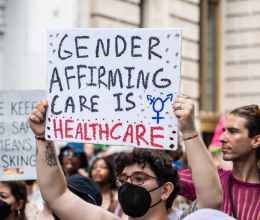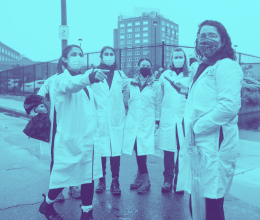
In a major victory for public health, the U.S. District Court for the District of Massachusetts today struck down the National Institutes of Health’s (NIH) directives that led to the cancellation of research grants based on sweeping, politically driven criteria. The court ruled that NIH’s actions targeting research involving disfavored topics and populations were unlawful, arbitrary and capricious, and therefore void. The court reversed the grant terminations at issue in the case, stating that the government must immediately make the funds available.
“Today’s decision is a crucial step in protecting public health and safeguarding critical research that helps us understand, prevent, and treat life-threatening diseases,” said plaintiff Dr. Brittany Charlton, associate professor at Harvard Chan School of Public Health. “Scientific research must be guided by evidence, not political agendas, and this ruling rightly restores important research projects that should never have been disrupted.”
“We are grateful that this ruling upholds the rigorous scientific process that the NIH has had in place for decades,” said Dr. Heidi Moseson, senior research scientist at plaintiff Ibis Reproductive Health. “Our research is about improving the accuracy of data collected in reproductive health research—work that is designed to improve the quality of care for all Americans. We should have been doing this work all along, without disruption. With this ruling, our team is one step closer to returning to the work we have already invested so much time and thought into. We will do everything we can to make up for lost time and ensure that the American public has the data we promised to deliver as soon as possible.”
“The ideologically motivated directives to terminate grants alleged to constitute DEI, ‘gender ideology,’ or other forbidden topics were, in fact, arbitrary and capricious, and have now been ruled unlawful,” said Center for Science in the Public Interest President Dr. Peter G. Lurie, one of the plaintiffs in the case. “Judge Young’s ruling thankfully starts researchers getting back to work delivering progress on cancer, diabetes, Alzheimer’s, HIV, and other health challenges facing our diverse population.”
In February, the NIH began a reckless purge of federal grants, halting application processes midstream, and stripping funding opportunities from its website. Hundreds of research projects — many of which have been underway for years, representing thousands of hours of work and billions of dollars in investment — were abruptly cancelled without a reasonable explanation.
On April 2, the American Civil Liberties Union, the ACLU of Massachusetts, Protect Democracy, and the Center for Science in the Public Interest filed a lawsuit challenging the abrupt cancellations on behalf of individual researchers, along with the American Public Health Association (APHA); the International Union, United Automobile, Aerospace and Agricultural Implement Workers of America (UAW); and Ibis Reproductive Health. Also, joining as co-counsel is Emery Celli Brinckerhoff Abady Ward & Maazel LLP.
“Today’s ruling confirms that science must be guided by evidence, not ideology. By blocking NIH’s unlawful directive, the court has protected the integrity of scientific research and ensured that critical studies, especially those focused on underserved and marginalized communities, can continue without political interference,” said Olga Akselrod, senior counsel in the Racial Justice Program at the ACLU. “This decision safeguards not only the researchers affected, but also the millions of people who stand to benefit from their work.”
“The court’s ruling is a critical check on the dangerous politicization of science,” said Kenneth Parreno, counsel at Protect Democracy. “By purging research funding based on ideology rather than evidence, the government didn’t just break the law; it sought to dictate what science is allowed to study and who gets to benefit. That’s not just an attack on researchers — it’s an attack on democracy itself. Today’s decision affirms that public institutions must serve the public interest, not political agendas.”




